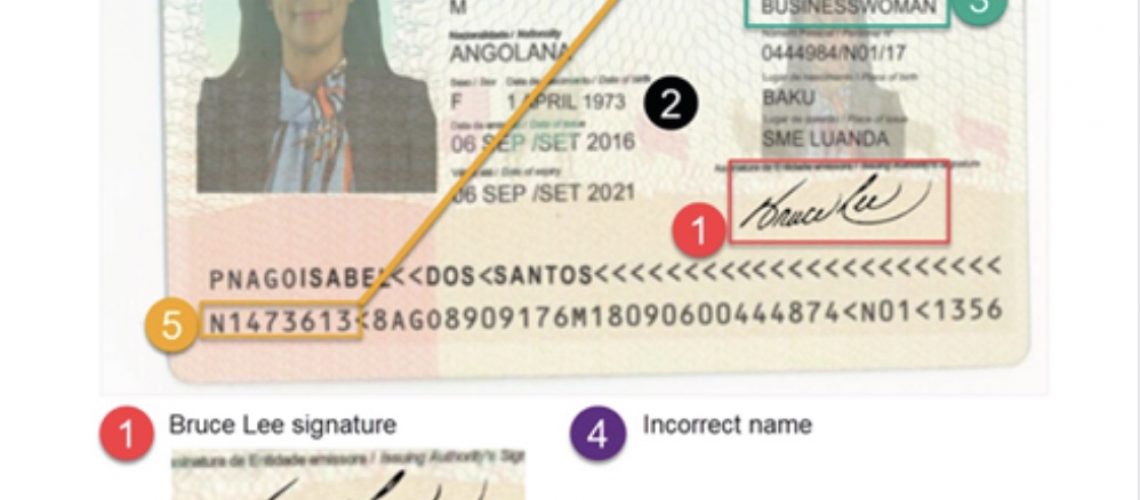A copy of a fake passport was used to fabricate evidence in the Angolan Courts during the proceedings that granted the freezing of the assets and companies of Isabel dos Santos in December 2019. The Angolan State used the fabricated evidence in an ex parte court claim – meaning Ms dos Santos and her lawyers were not present to contest the allegations. The forged evidence was relevant and material in supporting the case.
The Angolan Prosecutor went to the Luanda Civil Court and a magistrate of the Supreme Court in order to obtain the judgements, based on this fraudulent procedure. Those judgments were automatically enforced in Portugal without review by the Portuguese judiciary, a result of a convention between Portuguese speaking countries and judicial treaty.
At the end of April 2020, Ms dos Santos’ lawyers were given access to the court’s files. They then found the copy of the falsified passport and a string of emails regarding a scam investment in Japan.
Under a fake name, an internet fraudster claimed to be a Middle Eastern businessman representing the interests of Ms dos Santos. The target of his scam was a start-up Japanese company, Synapse Corporation Inc, to whom he sent a copy of Ms. dos Santos’ fake passport, and offered a loan agreement “from 10 million to one billion dollars” (Appendix two). These emails and fake passport were used by the Angolan Prosecutor in court as supporting evidence that Ms dos Santos was trying to dissipate her assets quickly and then illegally invest the proceeds outside Angola.
An Angolan intelligence services document was also discovered in the court file (Appendix four). This was fabricated as evidence to the court, claiming Ms dos Santos was selling her stake in the Angolan telecom company Unitel to an unnamed investor from the United Arab Emirates – therefore, taking money out of the country.
In court applications, parties must present honest and true evidence to support their claims, but the Angolan Public Prosecutor’s Office presented material evidence that was fabricated and based on a forgery. This court decision should be struck out as abuse of process and the judgment set aside.
The passport signed by Bruce Lee
The forgery of the passport is obvious at first glance (Appendix one). Yet, either by default or design, at least four Angolan authorities facilitated a fraudulent process. The Angolan Embassy in Japan, the Director General of Foreign Intelligence to whom the Ambassador transmitted this document, the Angolan court did not recognise – or were not willing to recognise – an obvious fake, and the Supreme Court, which issued the rogatory letter (Appendix three).
Two of these state institutions are judicial, another is diplomatic, and the last is security. This raises very serious questions about the independence of the judiciary in this case.
There are at least six giveaway errors in the forgery:
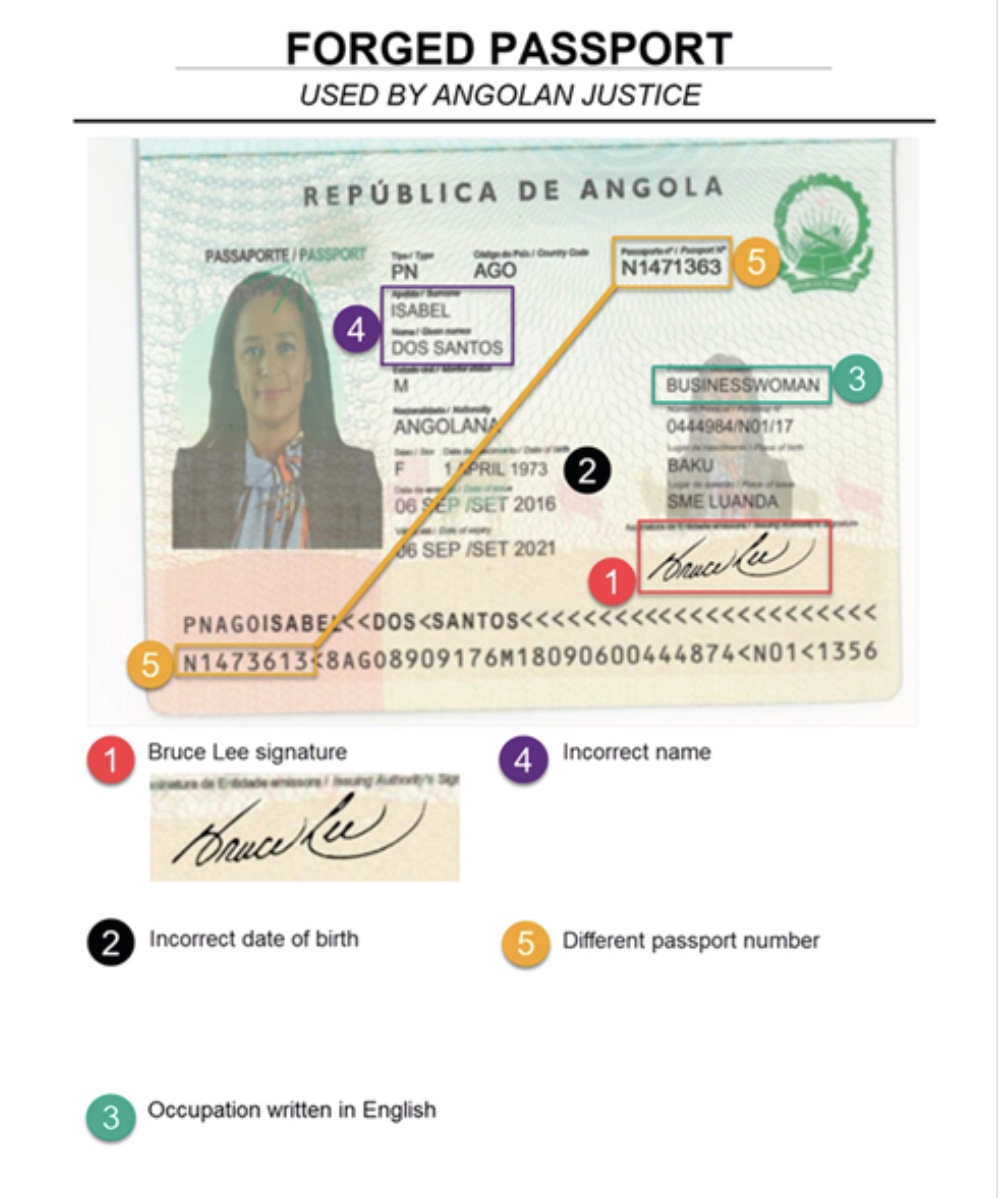
The name is incomplete. ‘Isabel’ is listed as a surname and ‘dos Santos’ as a first name. The date of birth is wrong. The passport number is not the same at the top and bottom of the page. On several occasions, English – not an official language in Angola – is used.
But the most ridiculous aspect is the signature of the issuing authority: this is a reproduction of the signature of Bruce Lee, the legendary kung fu actor who died in the 1970s.
This forgery was accepted as evidence to justify the seizure of the assets.
The Angolan magistrate in charge of the case therefore relied on an incorrect name, date of birth and marital status – a different identity. Yet, in her judgement, the magistrate has the correct details, directly contradicting the incorrect information in the appendix that she says qualifies as proof.
Irregular emergency procedure for freezing the assets of Isabel dos Santos
Without the false passport and the resulting false allegations made by the Angolan prosecution, it would have been impossible for the assets and companies of Ms dos Santos to have been frozen. As a consequence of these measures, many thousands of jobs are under threat.
Proof of an imminent risk of dissipation of assets is a sine qua non condition of protective custody in Angolan civil law. The false passport therefore enabled the Angolan prosecution to successfully use emergency and ex parte proceedings (meaning the defence was not present to contest the accusations).
Due to the absence of any defence on the basis of forgery, the court heeded the arguments of the prosecution. This included the unilateral and baseless decision to allow the exorbitant amount of damages claimed by the State, amounting to 1.1 billion euros.
This not only served as the basis for the confiscation of all the property of Ms dos Santos in Angola, but also for a rogatory letter asking the Portuguese judiciary to freeze her assets in Portugal. There is a cooperation agreement between these two countries.
After the Angolan Attorney General visited Lisbon to see his Portuguese counterpart, the Portuguese judiciary ratified everything without verification.
Political influence
The revelation of this false passport and the central role it played in the setbacks experienced by companies owned by Ms dos Santos, particularly in Europe, poses a problem of principle in both Angola and Portugal.
Ms dos Santos denies all the allegations made against her. She does not know the people involved in the scam, she never intended to sell her stake in Unitel, nor did she consider investing in Japan.
Responding, Ms dos Santos said:
“Looking at the forged evidence it is now clear that the Angolan state through the intelligence services, prosecution, civil court, and Supreme Court has colluded and contrived a case to obtain an unfair and illegal decision against me. False documents and false statements have been deliberately brought before the court. The resulting freezing orders are now threatening the livelihoods of many thousands of hardworking employees in Angola and Portugal. A principle of universal law requires that those who seek justice act with integrity and honesty, and that the rights of the defence be guaranteed.
“In Portugal, will the justice system take note of these revelations and proceed with the release of those assets seized illegally? Otherwise, I wish to ask a number of questions:
– Does Portugal accept false documents as judicial evidence?
– As a member of the European Union, does Portugal ignore fundamental rights, including the right to be tried fairly? The late handover of documents from the Angolan case meant it was never possible for me to raise any questions. In addition, the freezing of assets prevents me from recapitalizing companies whose survival are threatened by the current economic crisis.
– Is it not now clear that the objective of the Angolan authorities was to obtain an emergency freezing order – at all costs – in order to prevent me from ensuring my own defence and causing the bankruptcy of the companies in which I had invested and managed?
– How do the Portuguese and Angolan authorities intend to repair the damage caused to the hundreds of employees of my companies that are now at risk of bankruptcy following the freezing of my assets?
– Can the Portuguese judicial system continue to ignore the political influence in the handling of my court case in Angola?
Appendices
All the following appendices are taken from the file of the Provincial Court of Luanda at the end of April, when it formally notified Ms dos Santos of its decision to freeze all her companies and bank accounts. The page and reference number on the top right of the picture show these are actual pictures of the court file. Appendix one: The Fake Passport
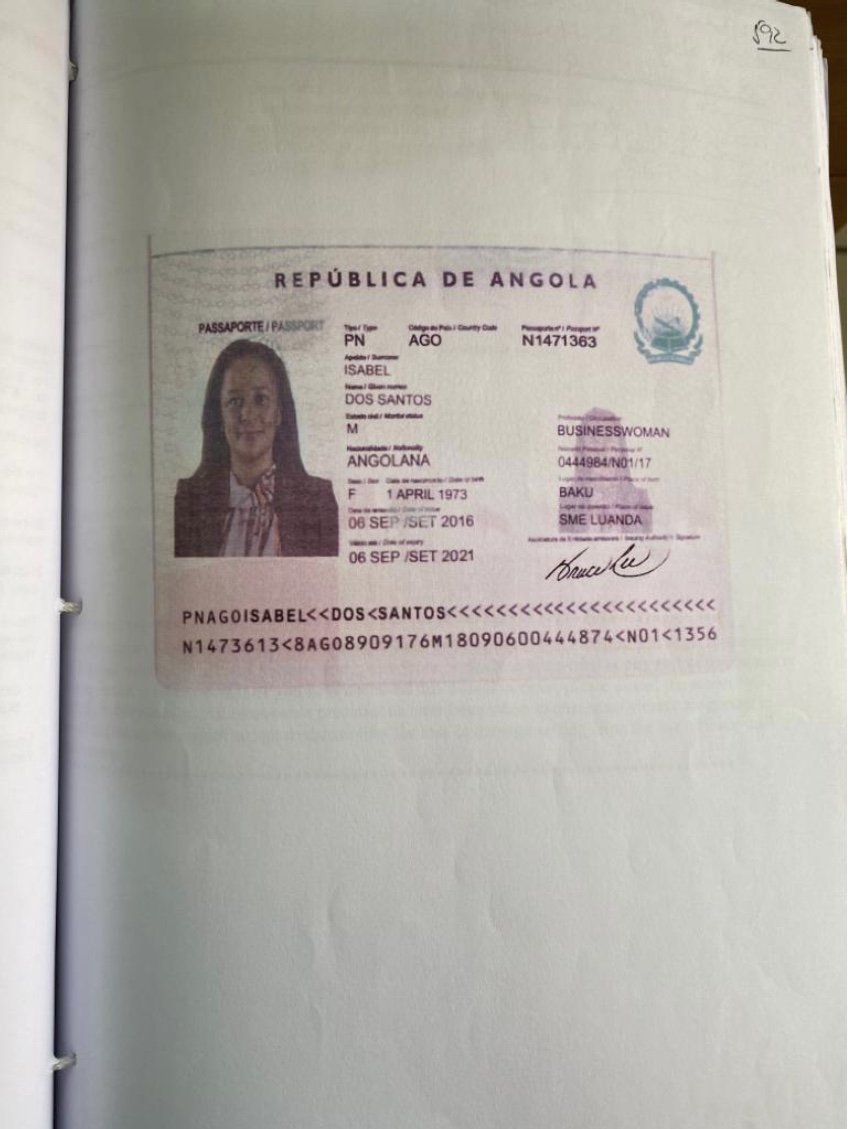
The mistakes are numerous:
1. Incorrect name: the copy of the fake passport says “Isabel dos Santos” instead of her full name.
2. The passport says in Portuguese, “Apelido: Isabel”, “Nome: dos Santos” – literally “Last name: Isabel” and “First name: dos Santos”. These are the wrong way around.
3. Incorrect date of birth: the copy of the false passport indicates April 1 1973, which is incorrect.
4. Incorrect passport number: there are two different passport numbers on the same document, N1471363 and N1473613.
5. Incorrect use of English in a Portuguese-speaking document: it says “businesswoman” in English and for the civil status “M” for bride, which does not exist in Angolan passports (it should be “C” for “Casada”, which is Portuguese).
6. Incorrect signature: the passport reproduces the actual signature of the late actor Bruce Lee in the place where the issuing institution should sign. It should be noted that Angolan passports are signed by their holders on a different page, with a fingerprint. Unusually, that page was not included in the court file’s appendices.
Appendix two: The email exchange
1. After verification, it appears that Muhammad Hamza or Muhammad Jamal do not actually exist.
2. The Japanese company, Synapse Corporation Inc, confirms in the e-mail exchange that it had serious doubts about the veracity of the investment opportunity and, believing that it is dealing with an internet scam, contacted the Angolan embassy in Tokyo. After several contacts described as “cooperative”, plus the transmission of e-mail exchanges and the copy of the false passport, the Japanese company never received the embassy’s response to its request for verification.
3. An email dated 7 November 2019 from the Middle Eastern businessman includes the following sentence: “Our board approved a collaboration with your company … we can invest from 10 million to a billion euros depending on the quality of the business plan presented.” This is typical of an internet scam. It is not credible that the embassy, the intelligence services, nor the prosecution were not concerned at this stage.
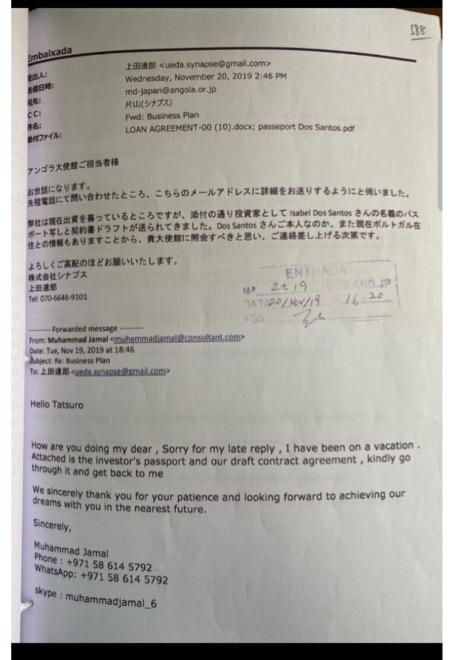
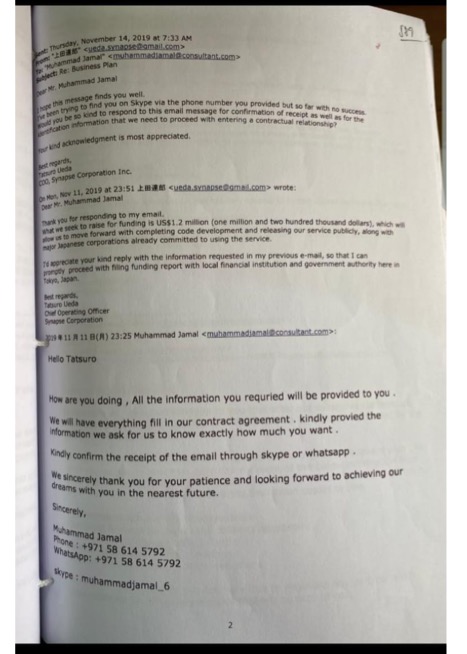
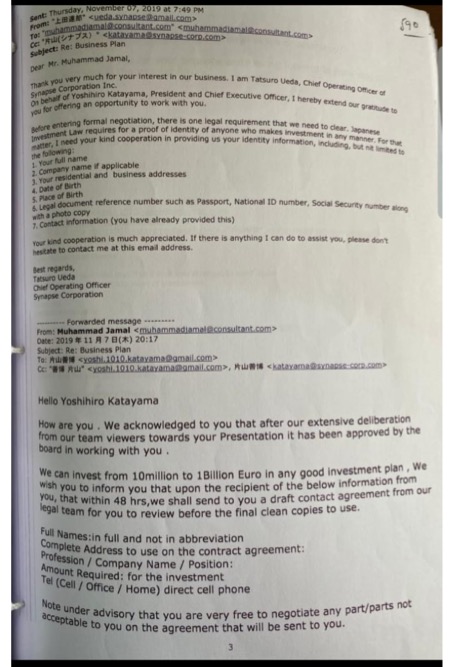
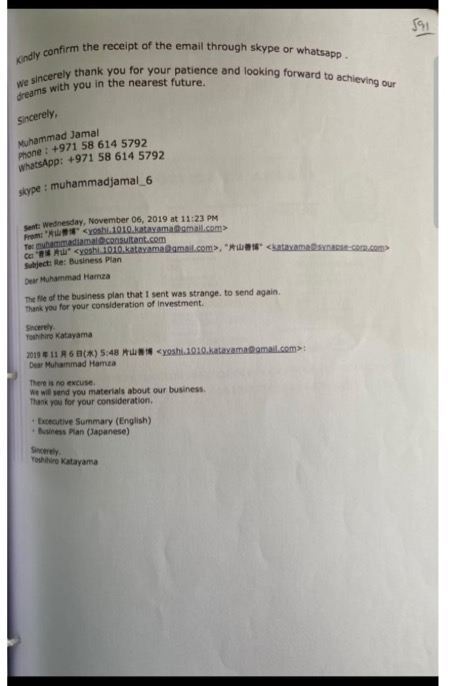
Appendix three: Letter from the Ambassador of Angola in Japan to the Director General of the Angolan External Intelligence Services, 21 November 2019
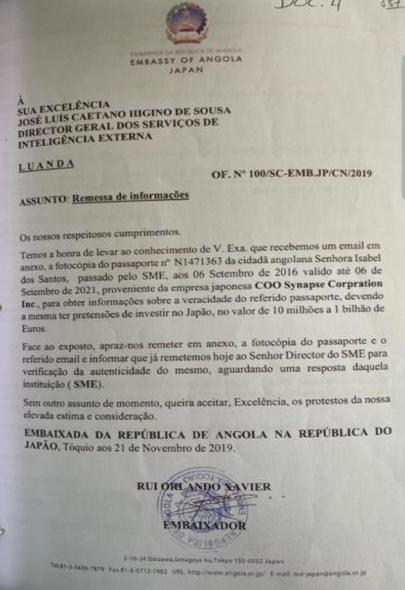
Translation:
From: The Embassy of Angola in Japan
To: His Excellency General Manager for the Foreign Intelligence Service in Luanda
Topic: Giving Information
Hello,
We have the honour to inform you that we received an email containing the photocopy of passport number N1471363 of Angolan citizen Isabel dos Santos issued by the SME service on 6th September 2016 valid until the 6th September 2021.
We received it from the Japanese company, Synapse Corporation Inc. (sic)- they were asking for information on the veracity of the referred passport.
Given the fact that the person in the passport is planning to invest in Japan a value of 10 million to a billion euros.
We are also attaching in the annex a photocopy of the passport and the emails and inform you that we already have sent this today to the director of the foreign migration services to check the authenticity of the passport and are waiting for an answer from that institution.
Please accept our high esteem and consideration.
Embassy of the Republic of Angola in the Republic of Japan (sic), Tokyo – 21st November 2019
Signed: *name*
There are three parts that demonstrate both a scam, involving false document, and an inexplicable level of incompetence:
1. One month before the false passport was accepted as evidence by the judge in Angola, the ambassador said in his letter that he had asked the SME (the institution that issues passports) to confirm its authenticity. Is it possible that the embassy sent the passport without ever having inspected it? Embassy services handle problems relating to Angolan passports on a daily basis. How could they not have noted the two different passport numbers on the same page, the confusion between first and last name, and the use of English, which is not allowed in an Angolan passport? It is clear that by attaching this passport to the file as overwhelming evidence, the Angolan state services knew they were transmitting a forgery – and did so deliberately for political purposes.
2. Why has the SME still not responded to the embassy’s request? How is it possible that the security services, the prosecutor and the court still pretend to be unaware that it was a false passport?
3. The end of the letter states the “Embassy of Angola in the Republic of Japan”. Japan is not a republic, but a parliamentary monarchy. This raises serious questions about whether this letter really comes from the Angolan embassy in Japan.
Appendix four: Letter from the Director of Cabinet of the State Intelligence and Security Service to the Special Prosecutor responsible
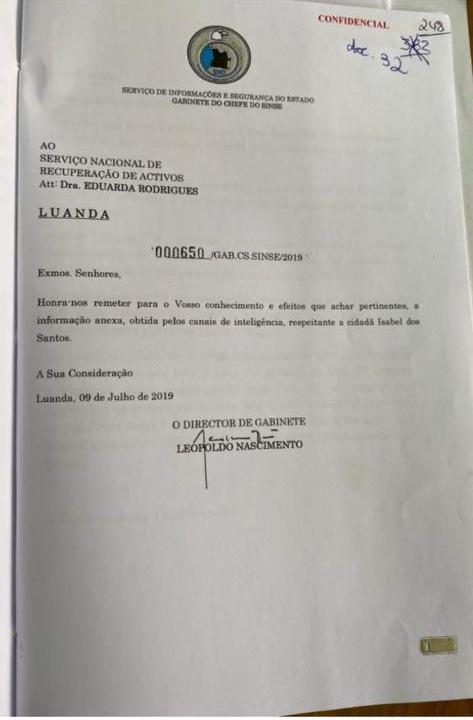
Translation:
Service of Information and Security of the State Cabinet of the Head of SINSE
Directed to National Service of Recuperation of Assets
Special Attention of Dr Edward Rodregrez, Luanda
Dears Sirs,
We have the honour of submitting to your knowledge to inform you and with the effects that you will think pertinent the information in annex that was gathered through the channels of intelligence in regard to the citizen Isabel dos Santos.
To your consideration, Luanda 9th July 2019
Signed: Leopoldo Nascimento Director of Cabinet
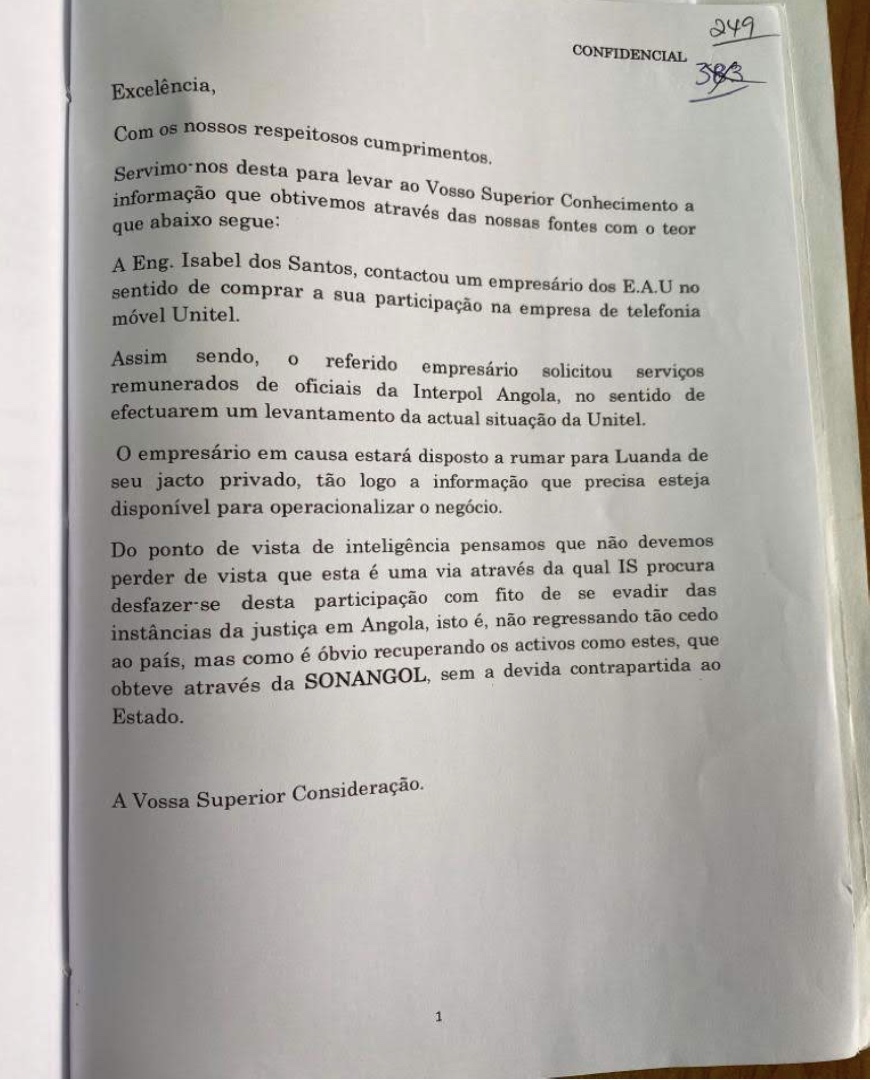
Translation:
Confidential
Your excellency,
With the expression of our respectful consideration.
We hereby submit to your higher consideration the following information obtained through our sources:
Ms. Isabel Dos Santos contacted a businessman in the United Arab Emirates to sell him her stake in the telecom company UNITEL.
Thus, the businessman in question sought the paid services of agents of Interpol Angola to verify the current situation of UNITEL.
The businessman in question said he was available to fly to Luanda in his private jet as soon as the information he needed to finalize the deal was available.
From our point of view, we believe that this is a means by which IS trying to get rid of her stake in order to escape justice in Angola, that is to say that by refusing to return to the country but obviously by recovering assets like this that she obtained through Sonangol without compensation for the State.
To your higher consideration.
The memo above is set out on pages 248 and 249 of the Angolan prosecution against Ms dos Santos. This shows how the Angolan security services have made accusations that are, at best, vague. There is reference to an unidentified businessman who has supposedly received a proposal from Ms dos Santos to sell her shares in the telecom company, Unitel.
There is no date, no precise references, no evidence, nor even the precise source of this information.
To establish the financial credentials of the UAE businessman, there is a reference made to his private jet, which he would use to travel to Angola to close the deal. This reference illustrates the extent to which the services did not in fact have any real factual information, but had to show that there was an “imminent risk of dissipation of assets” in order to obtain the court order.
Without realising it, the security services have unveiled a corrupt practice to the prosecutor by mentioning that the businessman intended to remunerate the agents of Interpol in Angola, even though Interpol services are free and do not cover financial audits of private companies. By mentioning this, the State has indicated that one of its most important security services is committing a criminal act. And this is through the judicial testimony from an official of the intelligence services. Yet the prosecutor has not opened an investigation into the matter.

